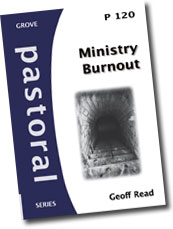Burnout is not a single condition but a syndrome which can include numerous elements, including depression, and is typically marked by emotional exhaustion, detachment and a sense of lack of achievement.
Geoff Read writes in his book, Ministry Burnout, How can sincere, motivated clergy find themselves at this point?
Why does burnout happen to Ministers? Is it that they are ‘weak’ people, ‘fix and please’ people, is it their personality type, or are they simply working long and ridiculous hours?
Israel Galindo urges clergy in Staying Put – A look at the First Ten Years of Ministry’ to remember the value of a sabbatical year and the principles behind it. He calls year seven in a parish the year of ‘recharge or burnout.”
No-one is superhuman enough not to take time out to rest from work or from people. We should follow the example of our Saviour, Jesus Christ, who would regularly took time to be alone and commune with God. Very early the next morning, Jesus got up and went to a place where he could be alone and pray. (Mark 1:35)
We need to be aware of the early signs of burnout and take steps to rectify it and take time to smell the flowers. Remember the old saying, prevention is better than cure.
Geoff has supplied a valuable tool worth looking at in Appendix 1: Am I in Danger of Burnout? You can purchase your copy of the booklet, Ministry Burnout by Geoff Read from Grove Books Limited.

See also, Clergy: God’s call?


Hi John
So just out of interest, perhaps in another blog post? Could you tell us how/what the Diocese of Tasmania does to help clergy through this 7th year? Are their structures in place enabling sabbatical?
Just curious
Hi Chris,
We are doing nothing intentional. We have some letters of offer which refer to periodic reviews, a common one for longer appointments being at the seven year point. I have highlighted the issue of ministry burnout and health as I am committed to building ‘a healthy church … transforming life’ and the health of those in part and full time ministry is a priority. My intention in highlighting the article is to keep clergy and lay workers health in the spotlight and demonstrate a willingness to engage. A few years ago we had Bishop Peter Brain from Armidale present to the clergy conference on his DMin research and published in his book Going the Distance: How to Stay Fit for A Lifetime of Ministry (ISBN 1-876-32673-5), which achieved a “highly commended” in the 2004 Australian Christian Book of the Year awards. Ministry health is a work in progress and all ideas are welcome. Thanks for your interest and blessings from Tas. Shalom.
Hi John
Certainly a valid point re burnout for clergy as they try to do so much. At the same time we need to be careful that the emphasis around this is not just for clergy but the laity as well. We see many members of the laity undertaking leadership roles in Parishes (often having multiple roles to undertake) all as volunteers. Yet there are still high expectations of them. Many lay members work full-time or part-time, look after elderly parents, have young children to care for and have crippling demands on their time and resources. In some Parishes without a paid Minister their role is even more vital. I’m not saying one role is more important or prone to burn-out than the other – just that this issue affecting the laity is so rarely highlighted.
Hi Andrew,
Absolutely correct. Laity burnout is a major pastoral and ministry issue for us. The old danger of the willing worker being crushed by overload. A key matter for the parish and diocesan leadership is for them to say the lay person, ‘You look like you are already carrying enough of a load’ and freedom and encouragement for the lay person to say, ‘I feel like I am already carrying enough of a ministry load’. Thank you and let’s be sure to maintain this as an open conversation in the parish and in the diocese more broadly. Shalom.
hallo ia asif from pakistan and iam priest of catholic church. iam very happy for you holy and great work.